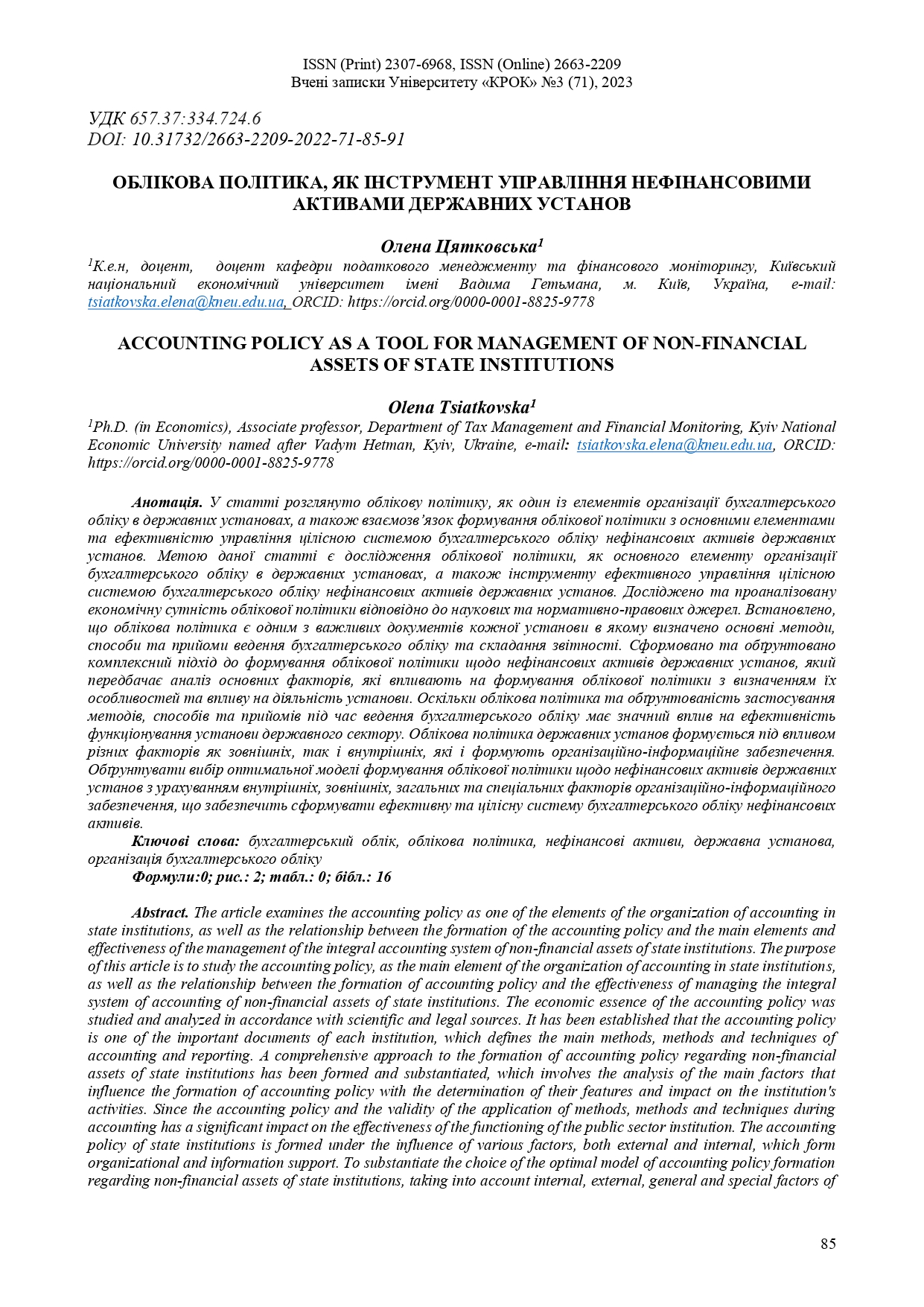ACCOUNTING POLICY AS A TOOL FOR MANAGEMENT OF NON-FINANCIAL ASSETS OF STATE INSTITUTIONS
DOI:
https://doi.org/10.31732/2663-2209-2022-71-85-91Keywords:
accounting, accounting policy, non-financial assets, state institution, organization of accountingAbstract
The article examines the accounting policy as one of the elements of the organization of accounting in state institutions, as well as the relationship between the formation of the accounting policy and the main elements and effectiveness of the management of the integral accounting system of non-financial assets of state institutions. The purpose of this article is to study the accounting policy, as the main element of the organization of accounting in state institutions, as well as the relationship between the formation of accounting policy and the effectiveness of managing the integral system of accounting of non-financial assets of state institutions. The economic essence of the accounting policy was studied and analyzed in accordance with scientific and legal sources. It has been established that the accounting policy is one of the important documents of each institution, which defines the main methods, methods and techniques of accounting and reporting. A comprehensive approach to the formation of accounting policy regarding non-financial assets of state institutions has been formed and substantiated, which involves the analysis of the main factors that influence the formation of accounting policy with the determination of their features and impact on the institution's activities. Since the accounting policy and the validity of the application of methods, methods and techniques during accounting has a significant impact on the effectiveness of the functioning of the public sector institution. The accounting policy of state institutions is formed under the influence of various factors, both external and internal, which form organizational and information support. To substantiate the choice of the optimal model of accounting policy formation regarding non-financial assets of state institutions, taking into account internal, external, general and special factors of organizational and information support, which will ensure the formation of an effective and integrated accounting system of non-financial assets.
Downloads
References
Brusca, I., Montesinos, V. and Chow, D.S.L. (2013), “Legitimating International Public Sector Accounting Standards (IPSAS): the case of Spain”, Public Money and Management, Vol. 33 No. 6, pp. 437-444.
Chan, J. (2003), “Government accounting: an assessment of theory, purposes and standards”, Public Money and Management, Vol. 23 No. 1, pp. 13-20.
Jensen, G. (2020), “The IPSASB's recent strategies: opportunities for academics and standard-setters”, Journal of Public Budgeting, Accounting and Financial Management, Vol. 32 No. 3, pp. 315-319.
Polzer, T., Adhikari, P., Nguyen, C.P. and Gårseth-Nesbakk, L. (2023), "Adoption of the International Public Sector Accounting Standards in emerging economies and low-income countries: a structured literature review", Journal of Public Budgeting, Accounting & Financial Management, Vol. 35 No. 3, pp. 309-332. https://doi.org/10.1108/JPBAFM-01-2021-0016
Батієвич Д., Садовська І., Кулинич М. 2023. Облікова політика: сутність та вплив зовнішніх і внутрішніх факторів на формування і практику. Економічний часопис Волинського національного університету імені Лесі Українки. 2, 34 (Вер 2023), 15–28.
Бутинець Ф.Ф. Організація бухгалтерського обліку: підручник / Ф.Ф. Бутинець, О.П. Войналович, І.Л. Томашевська; за ред. Ф.Ф. Бутинця. Житомир: Рута, 2006. 528 с.
Дерій В.А. Організація бухгалтерського обліку в підприємстві: курс лекцій. Тернопіль: Джура, 2003. 92 с.
Житний П. Принципи формування облікової політики. Бухгалтерський облік і аудит. 2009. №4. С. 25-28.
Кубік В. Д., Обнявко О.В. Етична складова облікової політики підприємств. Економіка: реалії часу. Науковий журнал. 2019. No 6 (46). С. 119-127. URL: https://economics.net.ua/files/archive/2019/No6/119.pdf (дата звернення 07.08.2023)
Кулик В. А. Облікова політика підприємства: набутий досвід та перспективи розвитку: Монографія. Полтава : РВВ ПУЕТ, 2014. 373 с
Лоханова Н.О. Облікова політика як інструмент управління економічною безпекою компанії. Інвестиції : практика та досвід. 2014. № 11. С. 12–13.
Методичні рекомендації щодо облікової політики суб’єкта державного сектору, затверджені наказом Мінфіну від 23.01.2015 р. № 11 URL: https://zakon.rada.gov.ua/rada/show/v0011201-15#n550
Оліховський В. Я. Теоретичні аспекти податкового планування. Вісник Національного університету «Львівська політехніка». «Менеджмент та підприємництво в Україні: етапи встановлення і проблеми розвитку». 2012. №722. С. 177-181.
Партин Г. О., Загородній А. Г. Облікова політика та її вплив на фінансові результати діяльності підприємства. Фінанси України. 2001. №1. С. 54–60
Про бухгалтерський облік та фінансову звітність в Україні: Закон України № 996 – XIV від 16.07.99 зі змінами і доповненнями. URL: https://zakon.rada.gov.ua/laws/show/996-14#Text
Пушкар М.С. Облікова політика і звітність: навч. пос. Тернопіль: Карт-бланш, 2003. 141 с.

Downloads
Published
How to Cite
Issue
Section
License

This work is licensed under a Creative Commons Attribution-NonCommercial 4.0 International License.

